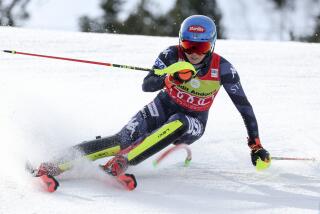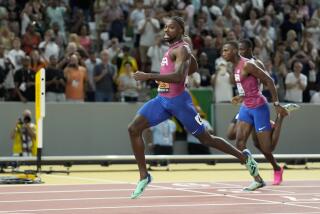WINTER OLYMPICS : Zurbriggen Halfway to Second Gold Medal
- Share via
CALGARY, Canada — Pirmin Zurbriggen “slept like a log” Monday night, got up Tuesday morning and won another downhill race.
Ho hum.
Unlike Monday, however, he did not have another gold medal hung around his neck. For that, he must wait until today.
The 1988 Olympic men’s downhill champion skied down a shorter course Tuesday while putting away a field that lacked several of his major rivals from the day before, including Swiss teammate Peter Mueller.
The race was called the combined downhill, and only skiers who are proficient in both downhill and the more technical slalom took part. Mueller, Monday’s silver medalist, is a downhill specialist.
Today, the combined entrants will compete in the slalom, and medals will be awarded on the basis of total points in the two races.
Because the downhill portion is weighted about 40% more than the slalom portion, Zurbriggen has what U.S. Alpine Director Harald Schoenhaar called, “a comfortable cushion.”
Even a minor injury in Tuesday’s race failed to slow Zurbriggen, who said: “On the first turn, my left knee came up and hit me in the chin, and somehow the middle finger on my left hand got caught in between.”
A hastily applied bandage took care of the problem on his finger, which was not broken. He also was seen checking his front teeth but seemed satisfied that none were knocked loose.
Zurbriggen’s two main challengers are Hubert Strolz and Guenther Mader, both of Austria. They are good slalom skiers, but Schoenhaar said: “Strolz must make up more than 2 1/2 seconds, and Mader has to beat Pirmin by more than 3 1/2 seconds to have a chance for the combined gold medal.”
The skier who figured to provide Zurbriggen with his strongest opposition, Marc Girardelli of Luxembourg, withdrew from the combined for, appropriately, a combination of reasons.
First, his injured left elbow is still troubling him, and this would have been especially bothersome in today’s slalom. Second, and perhaps more influential in the decision, his coach-father, Helmut Girardelli, was upset by Marc’s ninth-place finish in Monday’s downhill and charged that Atomic, an Austrian company, had supplied them with inferior skis.
“Why” Helmut said, “should we think they would be any better in the combined downhill?”
The slalom is Zurbriggen’s weakest event of the four Alpine disciplines, but he has 21 World Cup points in it this season, to 27 for Strolz and 37 for Mader.
Zurbriggen’s time on the 1 3/4-mile course Tuesday was 1:46.90, which was .48 of a second faster than runner-up Franck Piccard of France, who had taken the bronze medal Monday. Felix Belczyk of Canada was third, another .86 back.
Strolz was fifth in 1:48.51, while Mader was 11th in 1:49.56.
American Felix McGrath was 30th, 6.45 seconds behind Zurbriggen, and doubted that he had a chance for a medal, even though he is one of the better slalom skiers in the combined field.
“This was only my third downhill in two years and I made too many mistakes at the top,” McGrath said. “I had hoped to be only four or five seconds out going into the slalom. But these guys go fast.”
McGrath, who raced in downhills at Bad Kleinkirchheim, Austria, in mid-January and at Crans-Montana, Switzerland, last winter, said: “I don’t regret entering the combined. It’s given me a chance to get rid of any pre-Olympic jitters, and who knows, if I keep training downhill, maybe I’ll have a chance in the World Championships at Vail next season.”
Today’s combined slalom will be held on the same hill as the regular men’s slalom which is scheduled for Feb. 27, and this also was a consideration for McGrath, who otherwise would not have competed here until the men’s giant slalom Feb. 25.
Schoenhaar said he was happy with McGrath’s run, adding: “I’m mainly happy that he is still healthy.”
So, unfortunately for the rest of the world’s ski racers, is Zurbriggen, who said he “completely relaxed” Monday night, for the first time since coming to Calgary. He added, almost apologetically: “I am afraid my concentration today was not as great as it was yesterday.”
That must be what passes for a Swiss joke.
The women Alpine skiers will make final training runs today for their downhill race Thursday on Mt. Allan, and it looks like another gold medal is waiting in the wings for Switzerland.
Michela Figini, the 1984 Olympic downhill gold medalist, has recorded the fastest times in two of the four runs held so far. However, “Mickey” may have to do it without much backup support from her teammates.
Brigitte Oertli had one strong run, but Maria Walliser, the defending World Cup overall champion, has been skiing poorly, for no apparent reason.
Figini, 21, faces assaults on three fronts--from Canada’s Laurie Graham, Karen Percy, Kellie Casey and Kerrin Lee; Austria’s Sigrid Wolf, Anita Wachter and Elisabeth Kirchler, and West Germany’s Michaela Gerg and Marina Kiehl.
Of the American downhillers, Hilary Lindh seems to be handling the course well, while Pam Fletcher, the No. 1 U.S. competitor, is struggling. In Tuesday’s fourth training run, Lindh was 21st, Fletcher 24th.
More to Read
Go beyond the scoreboard
Get the latest on L.A.'s teams in the daily Sports Report newsletter.
You may occasionally receive promotional content from the Los Angeles Times.






